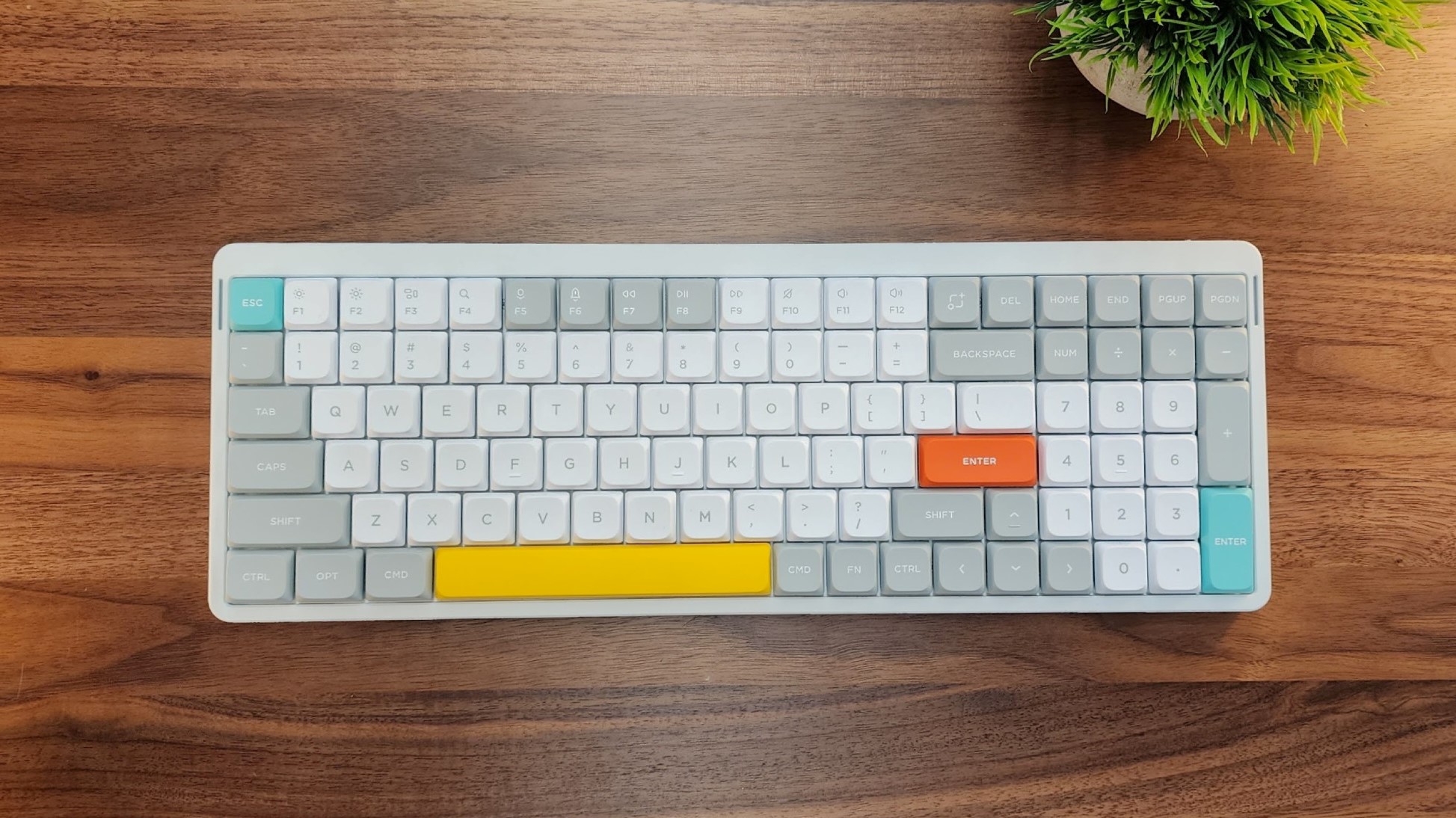
The Nuphy Air96 is the best low profile keyboard Nuphy has released yet and is one of the most compelling options on the market today. If you need a numpad with your extra-slim keys, it should be your go-to option.
It features a minimalist but stylish design with high-quality PBT keycaps, great switches, and an attention to detail that elevates the typing experience. The Air96’s software still needs work, but for a starting price of $120, it’s a remarkably good value. And with low-latency 2.4GHz wireless and multi-device Bluetooth connectivity, it’s one of the best wireless keyboards you can buy today.
Nuphy Air96 Specs
Design of the Nuphy Air96
The Nuphy Air96 is a compact full-size mechanical keyboard that utilizes low profile keycaps and switches for an extra slim form factor. At 14.7 inches (373.4mm) wide, it’s only one column wider than a typical tenkeyless keyboard, but has most of the keys you’ll find on a full 104-key (Pause, Scroll Lock, and Insert have been removed). The remaining buttons have been shifted together, eliminating any empty space and leaving a clean grid of keys.
At first glance, it can even look a bit too compressed but it works very well with a little bit of practice. The layout — colloquially referred to as a 96-percent — requires a couple of changes to pull off its “squeeze,” and both can impact your typing in the short-term. The first is that the zero on the numpad is shortened to take up a single unit (the width of a single letter key). The width of the Right Shift key has also been cut, dropping a full unit in width. If you have muscle memory built around these keys, be prepared to unlearn some habits.

Thinness is the name of the game with the Air96 (and the rest of the Air line-up). At its thickest point, it’s only 0.69 inches (17.5mm), which is about the height of a dime. The keys are also completely flat, matching the average laptop keyboard, so it’s uniformly slim. You won’t need a palm rest with it, but if you prefer a higher typing angle, there’s a pair of two-stage tilt feet on the back that can angle it from 3.5 degrees up to 8.5 degrees.
Despite its svelte layout, it offers a satisfying typing experience that feels much closer to a full-size mechanical keyboard than you might expect. You can choose from Gateron’s Low Profile 2.0 switches (linear red, tactile brown, or clicky blue), or Nuphy’s own customized switches: Aloe (lightweight linear), Daisy (linear), and Wisteria (tactile). These switches are 40% shorter than a standard key switch but offer 80% of the travel distance, depressed 3.2mm compared to the 4mm on a full-height switch. They’re clearly shorter to the touch but depress farther than you would expect from looking at them, making them an effective middle ground. The switches are also hot-swappable, so you can change them at any time without soldering.
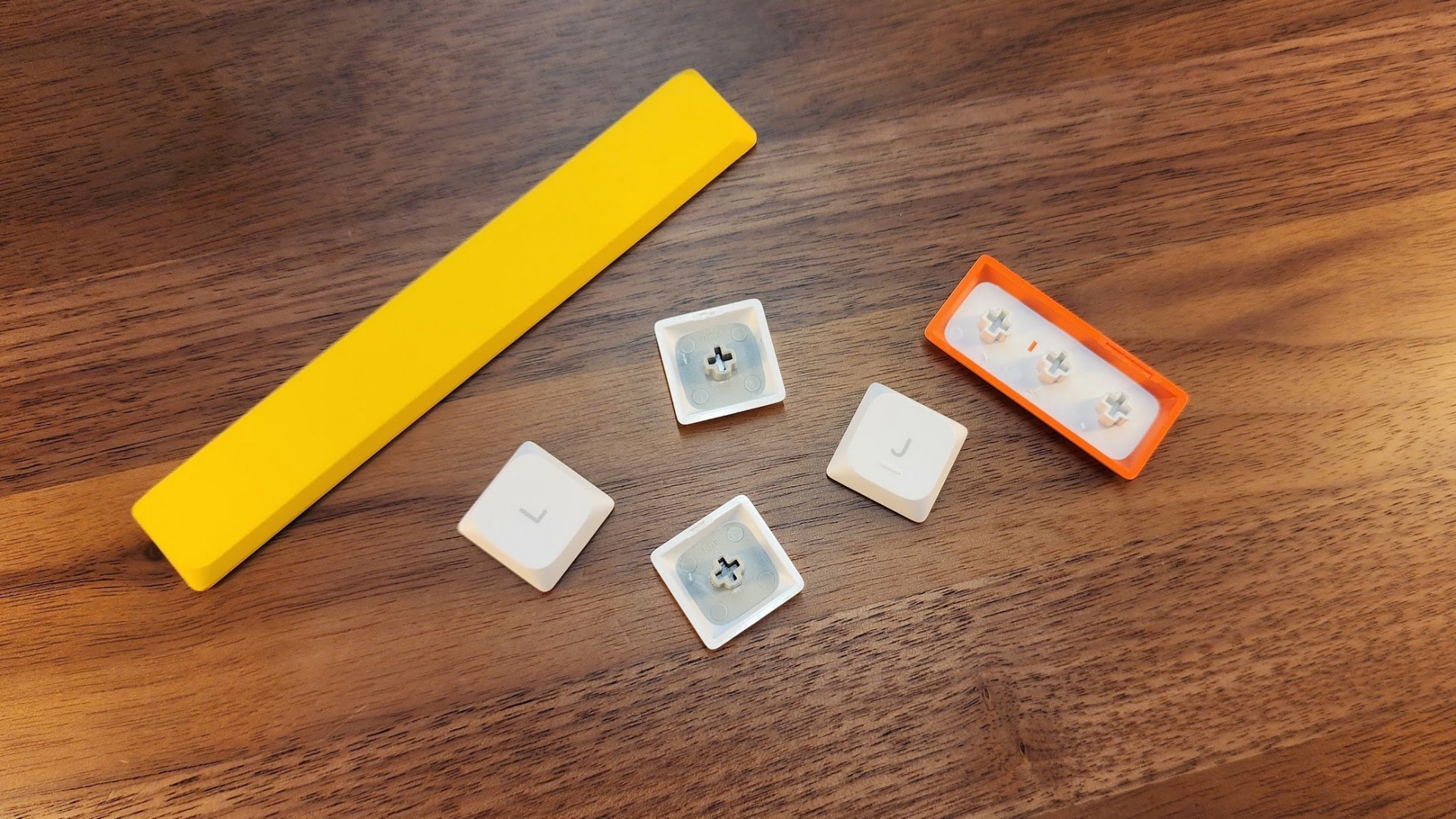
Nuphy uses thick doubleshot PBT plastic for the keycaps, and though the Air96 isn’t the only keyboard to offer that (the Keychron S1 does also), it’s currently the best in the business. Its keycaps are thicker than Keychron’s and the doubleshot is cleaner, resulting in crisper legends. The use of PBT, which is a denser plastic than the ABS used on most low profile keyboards, leads to deeper typing sounds and a more substantial feeling under your fingers. They aren’t backlit, though, so they aren’t the best for typing in the dark.
Beneath the switches and keycaps, Nuphy has added layers of sound dampening and sound tuning foam. There’s both plate foam and switch foam — which I’ll discuss in more depth in the typing section — but not only is this uncommon with low profile keyboards, it clearly demonstrates that Nuphy has been paying close attention to the custom keyboard community and the importance of satisfying acoustics.
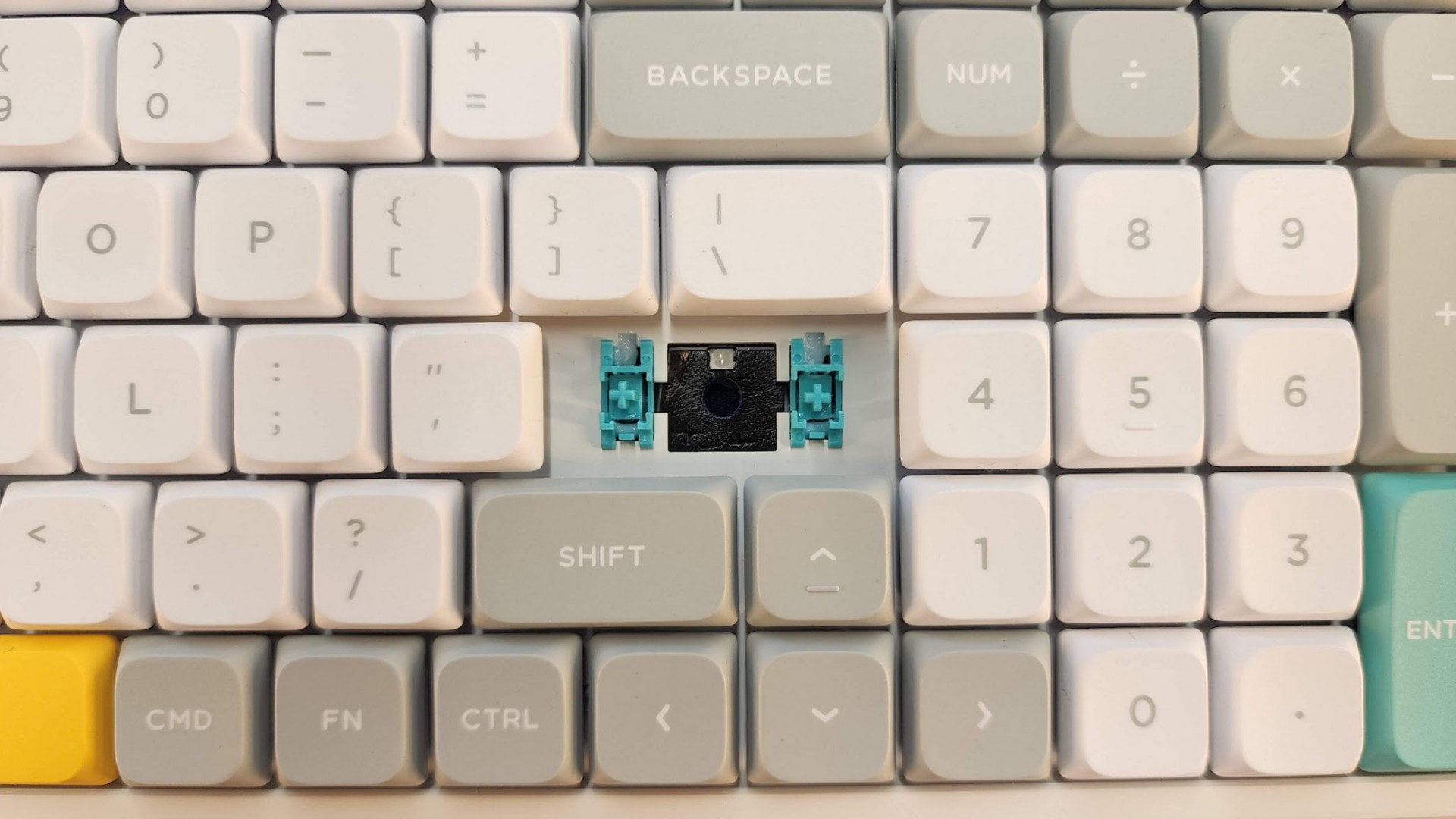
I also thought it was neat that the Air96 uses easy to access stabilizers for future modding. Many low profile keyboards make it difficult to access the stabilizers (and sometimes even remove the keycaps) or use proprietary designs that are hard to modify and remove rattle. Here, they’re essentially slimmed-down versions of the exact kind of stabilizer you’ll find in a full-size keyboard, so you can remove them and add lube to keep your keyboard sounding good over time. This shouldn’t be necessary for a good long time, however, because they’re well-lubricated and rattle-free straight out of the box.
The Air96 is a tri-mode wireless keyboard compatible with Windows and Mac. It supports wired connectivity, Bluetooth 5.0 with up to three devices, and 2.4GHz wireless using an included dongle and switches on the back. Connecting to different devices is simple enough with a quick Fn key combination, and the keyboard does a good job of remembering connected devices and swapping with only a second or two of downtime. For gaming, you’ll want to use the included dongle, however, as it sports a full 1000Hz (1ms) polling rate compared to the 125Hz available over Bluetooth.
Battery life is good, but not amazing. With lighting turned off, you can count on up to 300 hours over Bluetooth (or about 38 eight-hour workdays). Turning on RGB backlighting drops this number down to 25 - 55 hours. You’ll want to use the RGB, too, because the lighting looks great — even though the keys aren’t shine-through.
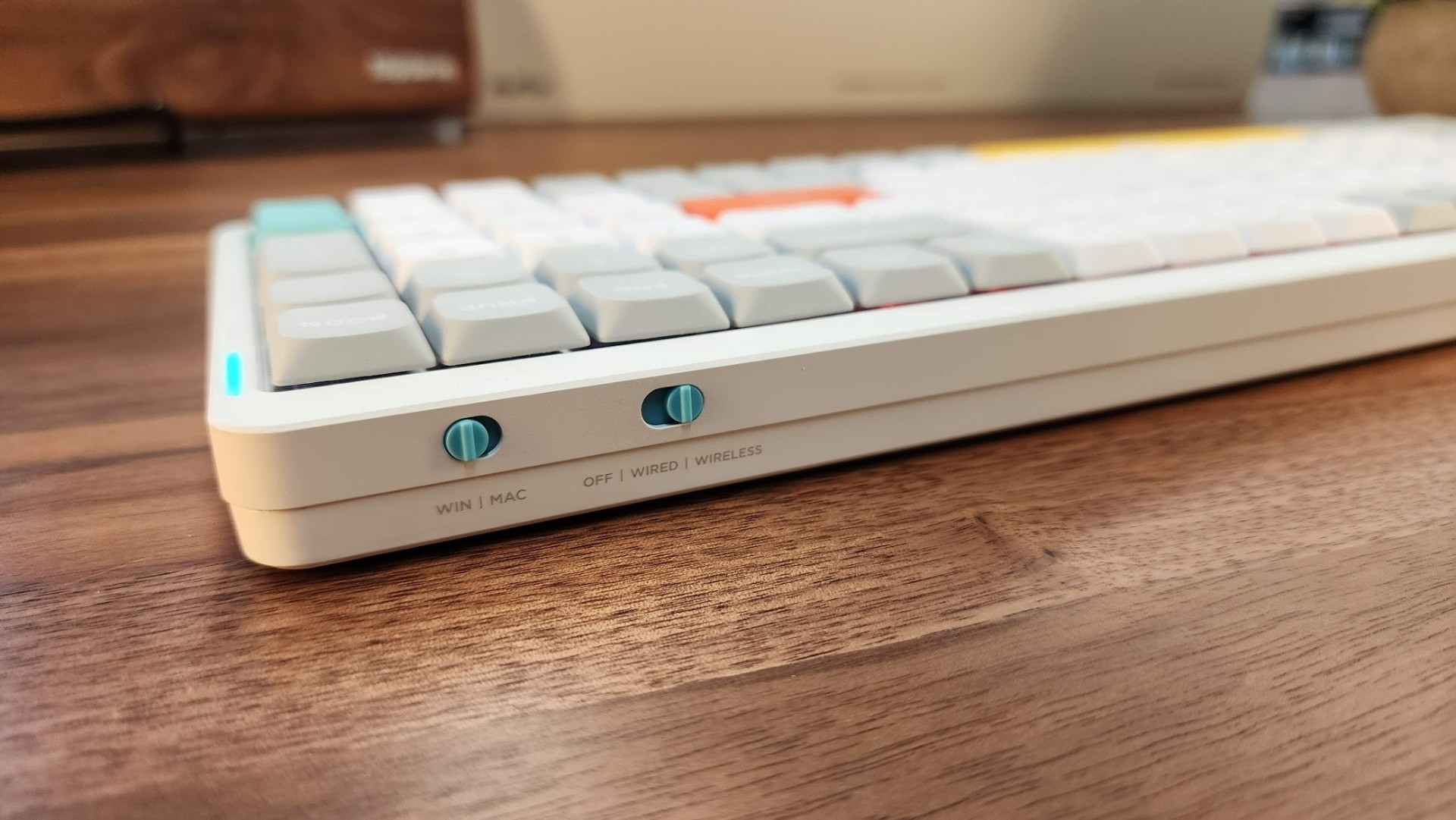
Nuphy places a premium on style, and that shows up in both the lighting and the colors it uses in the keyboard’s design. As we’ve come to expect from mechanical keyboards, every key is individually backlit and can be customized using the Nuphy Console software. There are also 16 built-in presets, including the usual rainbow wave, breathing, and reactive typing effects. Nuphy has also built two accent strips into the upper right and left that double as indicator lights for wireless pairing and battery life.
The keyboard is available with a white or gray aluminum frame (the back is plastic) and matching light or dark keycaps. Both versions use white and different shades of gray but are also outfitted with accent colors on the Enter keys, Spacebar, and Escape key. They’re bright cyan, orange, and yellow and make the board pop with personality. Flip it over and you’ll find that these same colors are used on its feet, USB Type-C port, and its two selector switches, Win/Mac and Wired/Wireless/Off.
Typing Experience of the Nuphy Air96
The Air96 provides one of the best typing experiences available on a low profile mechanical keyboard today. Nuphy puts exceptional effort into tuning the sound and feel of its keyboards, implementing new switches, foam layers, and features to enhance the experience with every iteration. As the latest entry in the Air series, it maintains the qualities that made the typing experience so pleasant on prior models and builds upon them.
One thing needs to be said up front: if you’re coming from a full-size mechanical keyboard, the Air96 has a learning curve that takes a day or two to overcome. The flat profile of the keys keeps the height consistently low, like a laptop keyboard, but it’s much easier to press a key off center and accidentally press the one beside it. The compressed layout also shrinks the right Shift and 0 key on the Numpad, which can also lead to mistakes. Typos were much more frequently over my first five or six hours of typing and gaming. These mistakes fade with practice, but it can impact your productivity in the short term. If you’re used to typing on a laptop, this likely won’t be as much of a concern.
Once you do come to grips with the flat profile and compact layout, the Air96 impresses. Despite their slimness, the keys have a surprising amount of travel, bottoming out at 3.2mm. It’s not quite the 4mm of travel offered by a standard MX-style switch, but it’s not far off either and feels very satisfying and “mechanical” under the fingers. It’s the same depth as the Kailh Choc V2 switches found in the Logitech MX Mechanical, though a touch deeper than older Nuphy Airs, which only had 3mm of travel. It’s noticeably more than the new Cherry Ultra Low Profile MX switches found in the Corsair’s K100 Air (1.2mm), so you’ll find that these switches feel much closer to a traditional mechanical keyboard that they first appear.
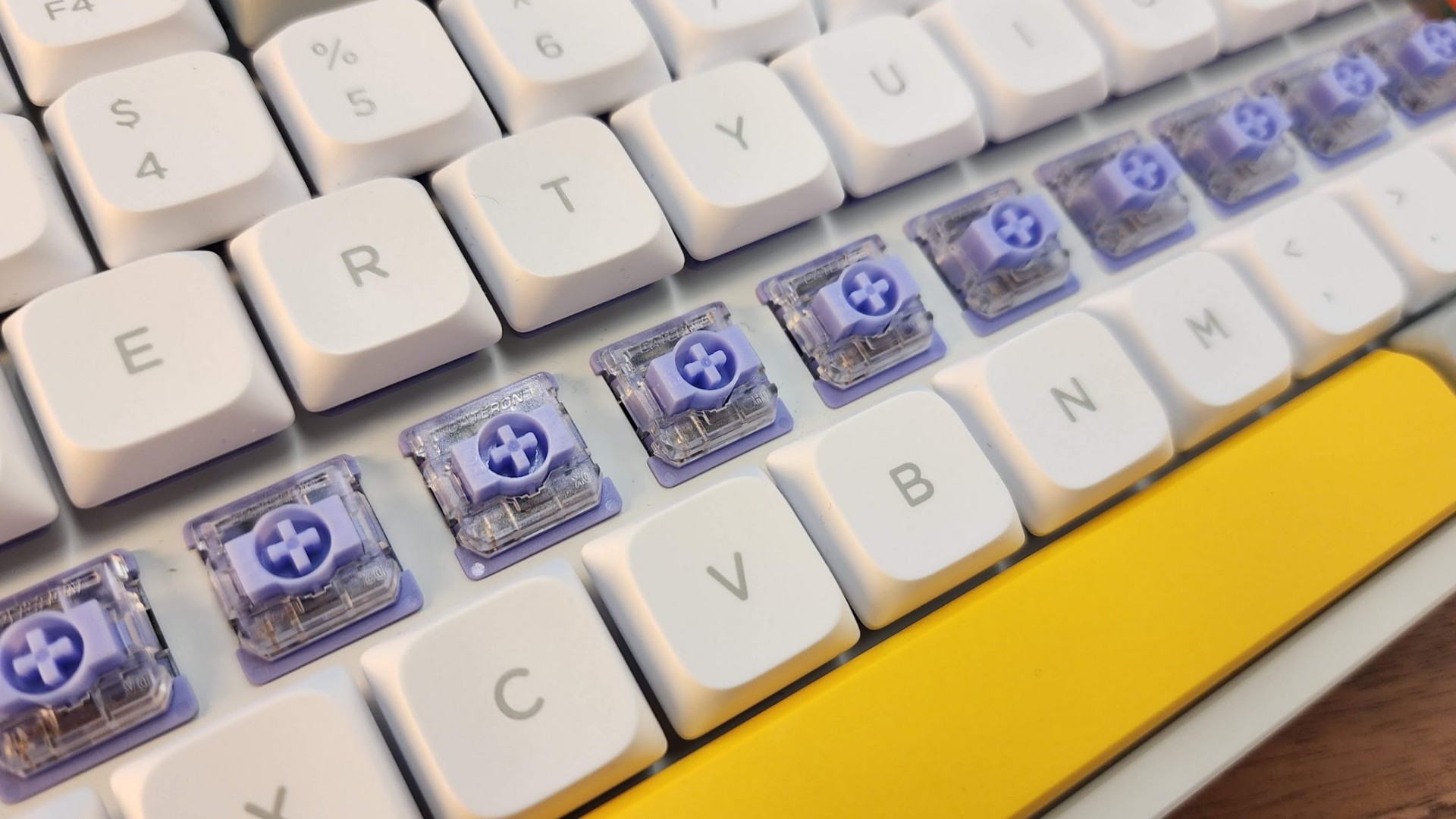
My unit was sent with Nuphy’s own Wisteria switches. They’re a medium-weight tactile switch (about five grams heavier than a Gateron Brown 2.0) and come pre-lubed from the factory. They have a substantial tactile bump right at the top of the key press, which is perfect for a low profile, flat keyboard like this. That early bump allowed me to type with a lighter touch, increasing my speed from an average of 111 WPM on my full-size keyboard to 117 WPM here. It’s a small improvement but a gain nonetheless (I’ve been pushing to break 120 WPM average for the last year on my daily driver keyboards).
The keys have a substantial feel to them thanks to the Air 96’s thick PBT keycaps. While I would have liked a bit more texture (they’re quite smooth), the extra material under the fingers and its density compared to more common ABS plastic found elsewhere definitely lends it a more satisfying feel.

For this model, Nuphy improved the overall design by adding two additional layers of foam to the case structure, enhancing its acoustics. There is now a layer of PORON foam between the plate and PCB, isolating the switches to draw out their sound. Beneath the switches is a layer of PE foam, which is a common trick in the enthusiast community to add a bit of pop to the typing experience. There is no case foam — which is a bit odd, since Nuphy clearly took inspiration from the enthusiast community with these additions.
The additional foam benefits the typing experience, adding a bit of deepness to the overall sound. The PE foam adds a hint of pop, but neither are as impactful as you might expect coming from a full-size keyboard. While I can’t be sure, I believe the effects are more subtle because of the tray mount structure and lack of bottom case foam. It’s one of the best-sounding mechanical keyboards you can buy, but modders may want to tinker to see how they can elevate it further.
The only low profile keyboard I know of that offers a better typing experience is the Lofree Flow, which is currently only available in a 75-percent layout. It has a similar feature set (minus 2.4GHz wireless) but uses a gasket mounting structure and silicone dampening in addition to its foam. That won’t work if you need a Numpad, though, which leaves the Air96 as the best choice for low profile typing in a full-size layout.
Gaming Experience of the Nuphy Air96

The Nuphy Air96 isn’t designed to be a gaming keyboard, but it works well as one thanks to its excellent wireless connectivity. The 2.4GHz wireless dongle allows you to maintain a rock solid connection at 1,000Hz (1ms), so it’s as if you’re playing wired even when you’re not. The RGB strip on the left can also be set to constantly show your battery status, so you don’t need to worry about the battery running out mid-match.
The tactile Wisteria keys worked very well to let me know when my inputs were being sent and helped to prevent misclicks. I was able to try the keyboard with a set of Gateron Red low profile switches as well, and would definitely take the tactile Wisterias instead. Linear switches tend to be the better choice on full-size keyboards, but with the reduced travel inherent to the Air96’s design, and the completely flat keycap profile, I found Reds to simply be too sensitive and prone to accidental presses.
The 98% layout also lends itself well to MMORPGs and games where you need to keep lots of skills on hand. The software is rough around the edges, but most games allow you to bind keys to the Numpad in the settings menu, so you don’t need to contend with it unless you’d like to assign macros.
Depending on the types of games you play, the added width of the Air96 could be a problem. It’s a compact full-size keyboard, but is still bigger than a TKL. Mousing space will be less than many of the best compact gaming keyboards like the ROG Azoth or the Steelseries Apex Pro Mini.
Software for the Nuphy Air96
The Air96 uses Nuphy Console for all of its programming, and it’s currently in beta. It offers the basics of what you would expect from a keyboard software suite and no more, and still has a number of bugs that need to be ironed out. My sample wouldn’t detect at all using the 2.4GHz dongle, and if I plugged in without flipping the switch to wired mode, it would repeatedly crash.
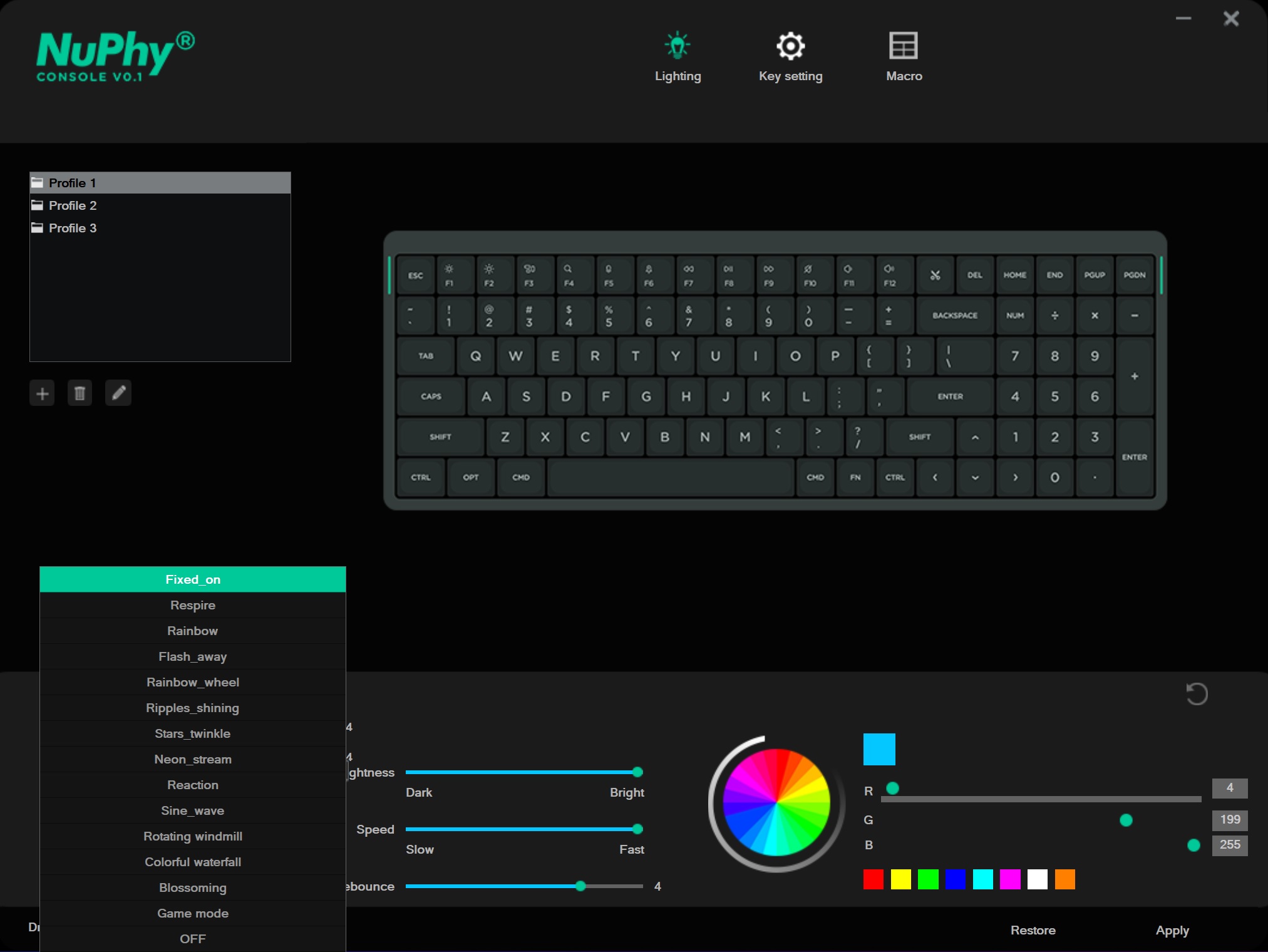
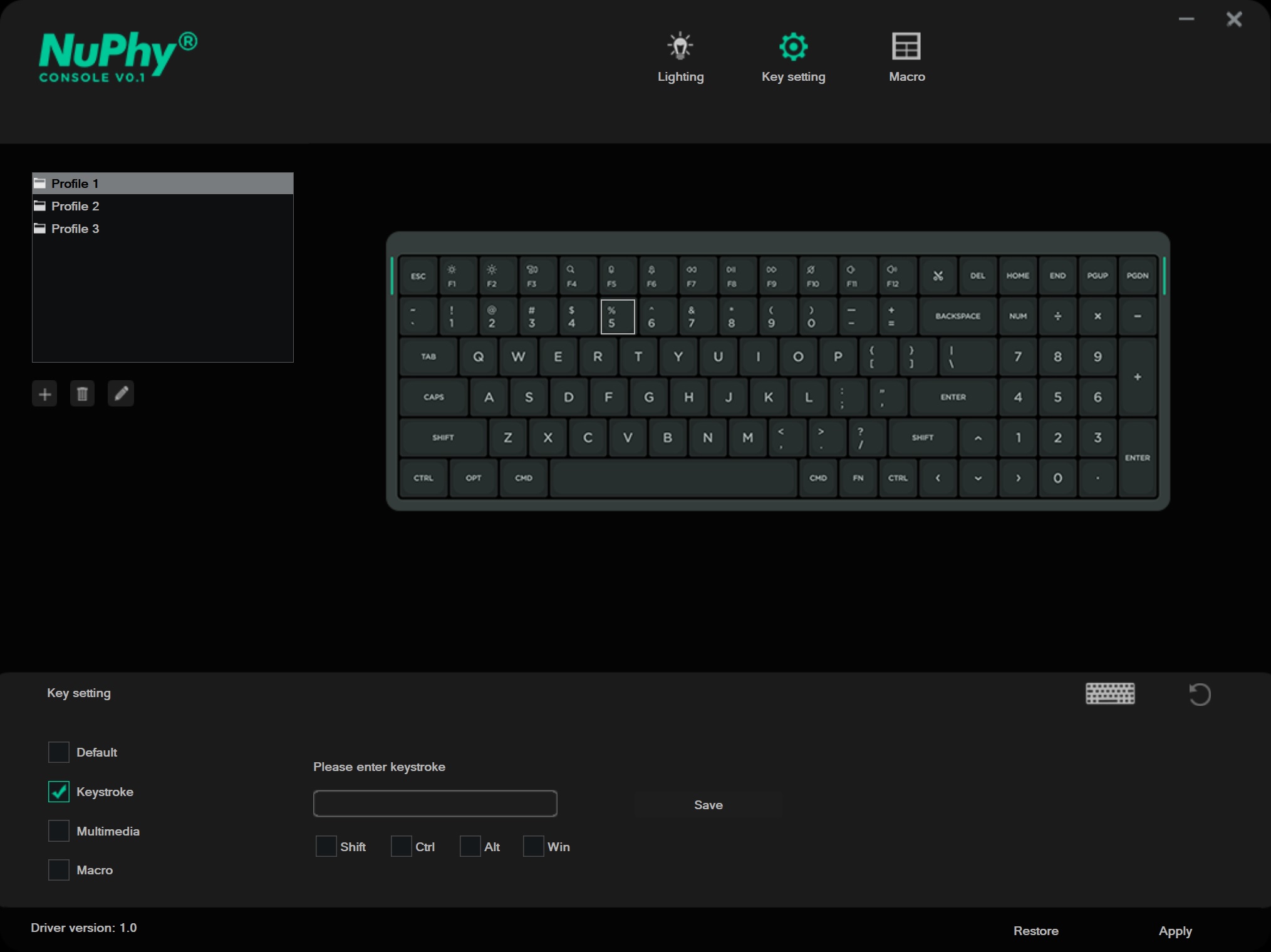
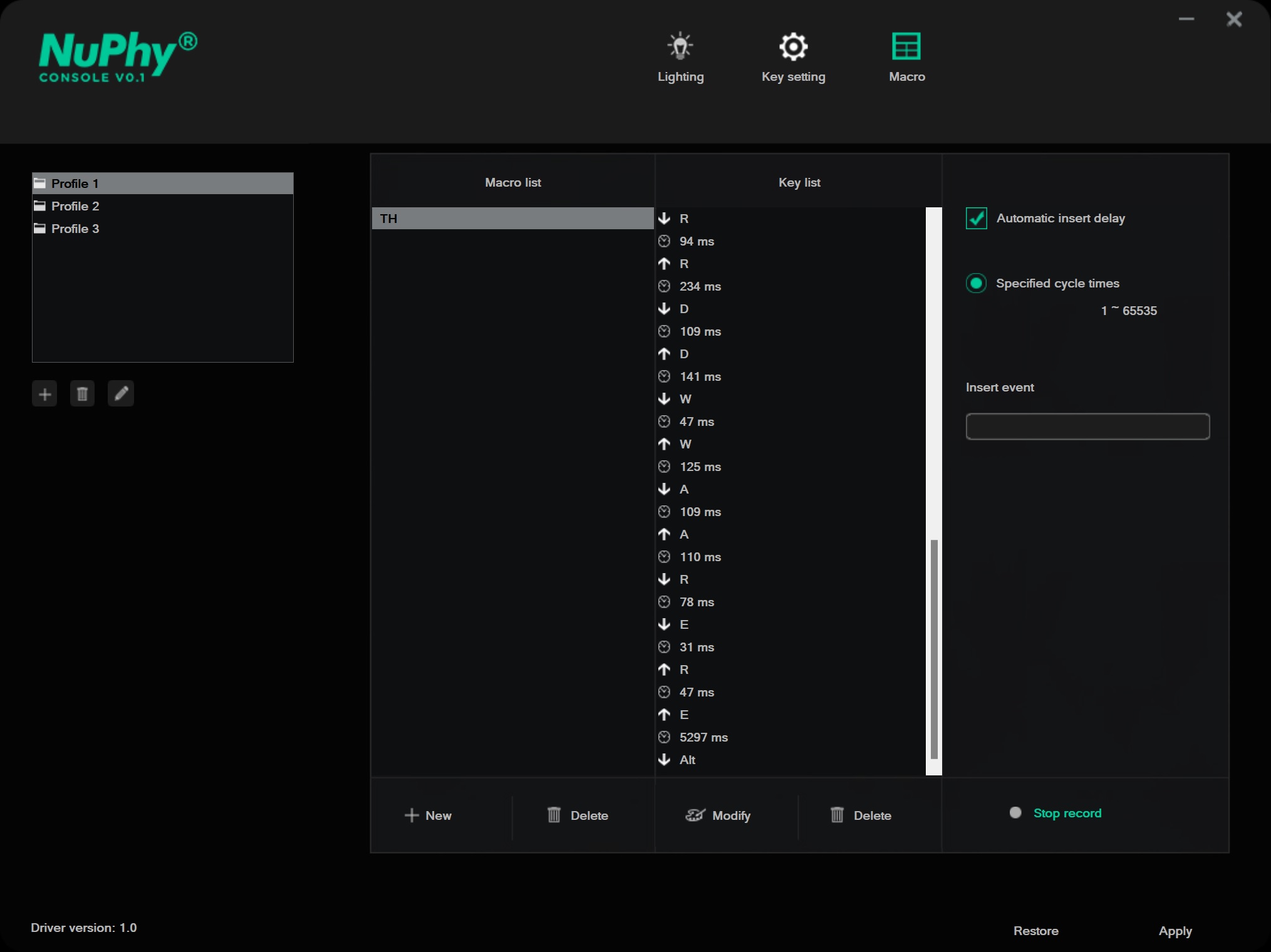
Broken across three tabs, the software allows you to personalize the lighting presets (you can’t set lighting per key), remap keys to different keyboard commands and multimedia controls, and assign macros. It’s simple, and to Nuphy’s credit, is easier to use than I found it to be just a couple versions prior, but it’s currently in a “basics only” state. That means no per-key RGB customization, no mapping Windows shortcuts or application launches, or setting timers for in-game cooldowns.
It works, but there’s still a lot of room for improvement.
Bottom Line
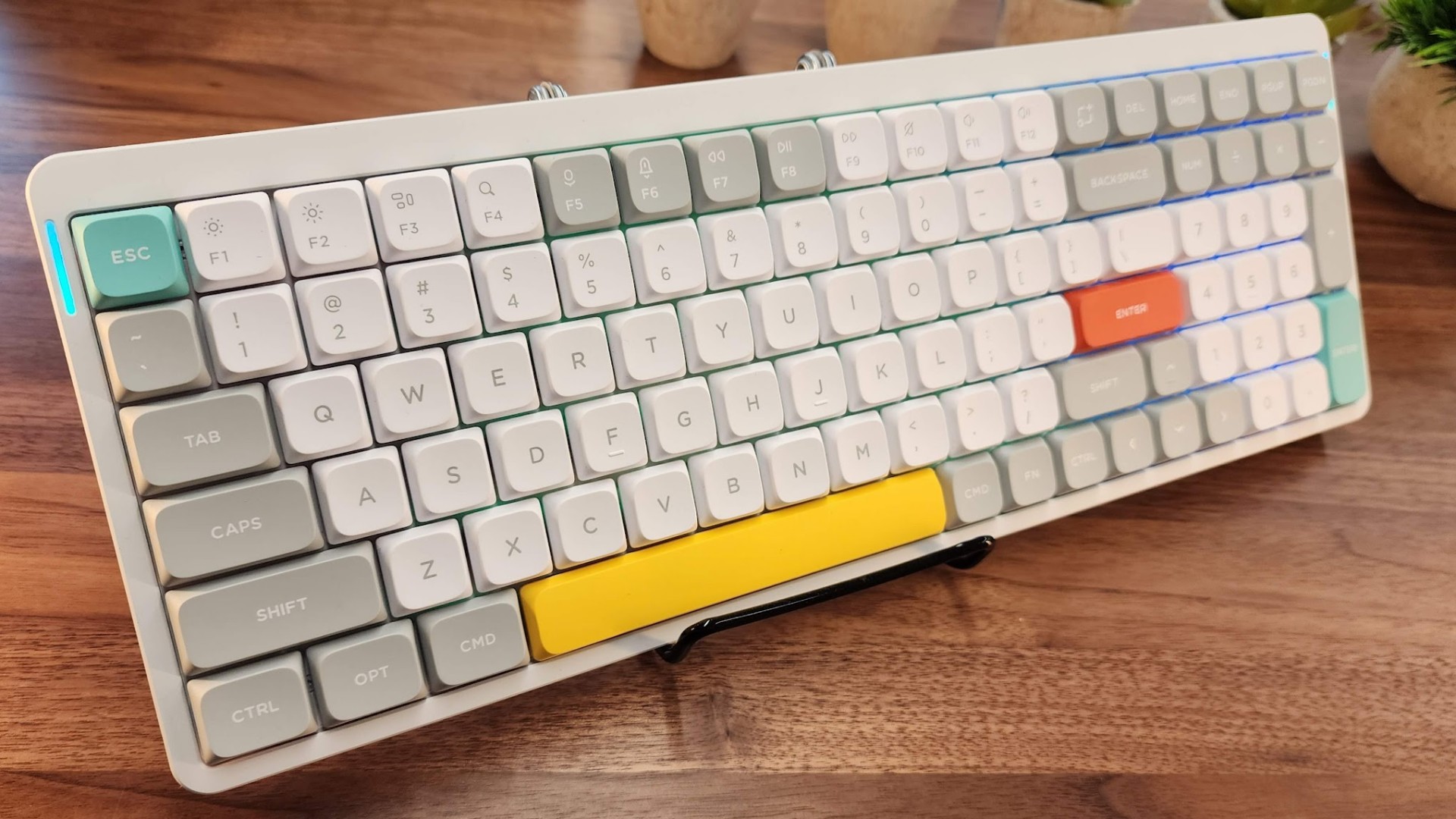
The Nuphy Air96 is an excellent choice if you need a low profile keyboard with a Numpad. Whether you spend $120 for the base model or $130 to upgrade the switches, it provides a satisfying and reliable typing experience that leaves you to wonder why some of the bigger options haven’t upped their game already. Nuphy, the little guy, has lessons the bigger brands would be wise to learn from.
The biggest drawback is its programmability. Nuphy Console allows you to remap keys and assign macros, but it’s rough around the edges and still in development. If you need advanced programmability, the Logitech MX Mechanical is a good alternative. For something with equally good programmability and keys that are much closer to scissor switches, the Corsair K100 Air is also worth considering.
Nuphy tops both in typing experience, however, and leads the pack in build quality and pricing. For low profile fans that also need a Numpad for productivity, it’s one of the most solid options available today.
MORE: Best Gaming Keyboards







